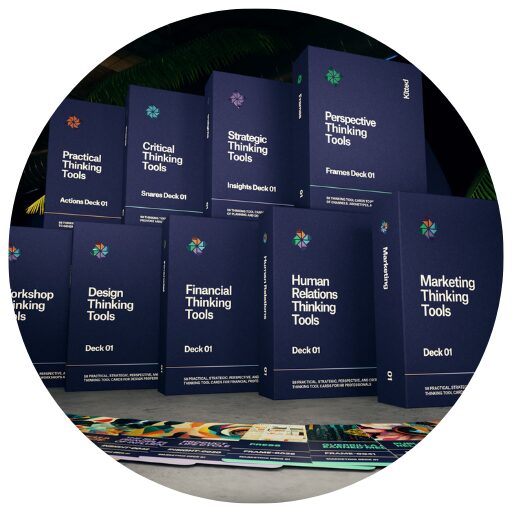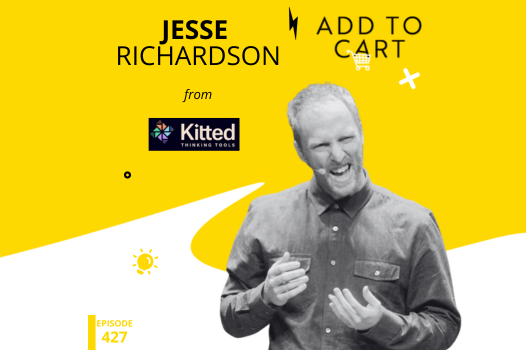In this episode of Add To Cart, we are joined by Jesse Richardson from Kitted Thinking Tools
Around 14 years ago, armed with a background in design and advertising and a man-crush on Stephen Fry, Jesse began a journey to popularise critical thinking, reason and understanding for the greater good. It started with a Creative Commons poster and deck of cards, grew into a crowd funded offering and is now a SaaS platform and a framework for businesses to harness the benefits of higher order thinking – backed by some of the internet’s biggest thinkers such as the founder of Duck Duck Go and Harvard psychology professors. This is one of our longer conversations on Add to Cart, but this topic is so fascinating and Jesse is such a great explainer of concepts, I wanted to make the most of him! Jesse shares the most common logical fallacies and how they work in our minds, he unpacks how to most effectively brainstorm as a team and why we should all be trying to unleash our inner four year old.

“Alot of the best thinking is done by people with quiet voices and we ought to foster a forum and a format to be able to hear everyone’s voices”
Jesse Richardson
Channel your inner four year old!
One of our thinking tools is a brainstorming tool called 10 ideas in 10 minutes. And that’s a way of getting your brain to shut off its critical voice that’s always saying, that won’t work, and just start the creative gears rolling and get into that flow state where the pen is starting to move, the fingers are starting to fly on the keyboard.
And once you get into that state, new connections start to happen more because you’re no longer taking all of the 12 plus years of schooling you’ve had that have told you that you should only have one right answer and to not raise your voice unless you know what it is and actually become creative, which is what every four year old is before they’re taught not to do that, because that part of you still exists. It’s just being quietly strangled in the background of your mind. And once you get over that and you start thinking creatively again, all these ideas come out.
Then you can use that together with other ones. So we can go, okay, let’s have 10 ideas for 10 minutes thinking about this from the customer’s perspective. One of our frame cards is the customer’s. And let’s have a think about this in terms of the Pareto principle, which is about optimization, the 80 -20 rule. So let’s think about 10 ideas in 10 minutes for the target audience, for the customer, and how do we optimize? How do we use the Pareto principle for that? So that’s an example of how you could use thinking tools in a multi -modular way in a workshop or a brainstorming session or a strategy session.
Logical fallacies
So there are essentially 24 fallacies of logic and 24 cognitive biases and three game cards, which are ways that you can use them. And some examples of them might be like the appeal to nature fallacy, which is thinking that just because something is natural, therefore it’s good. Right?
And obviously natural things can be things like arsenic or murder, and they’re not necessarily very good things. So the fact of something being natural doesn’t necessarily mean that it’s good, But we have this heuristic, we have this shortcut in thinking, we think, well, whole foods and natural things are better than plastics. And that’s a fine heuristic for us to have, but what happens with a lot of erroneous thinking is that we take these things that are true a lot of the time and presume them to be true all of the time. And what we need to do is just be a little bit more careful in our thinking.
Another example might be something like the false cause fallacy, which is thinking that just because one event follows another, that the previous event is therefore the cause of the following event. So an example that we use in the cards for this is that over the last 300 years years, the amount of pirates has been steadily decreasing whilst the temperature of the atmosphere has been increasing. So therefore pirates cool the world and global warming is a hoax. So you see the kinds of errors in logic that can be easily made.
Cooperation wins over domination
On a deep philosophical level, this is the great battle… it’s not between good and evil. It’s between the aspect of our psyche and our emotional reality that wants to dominate and win and the aspect of our psyche and emotional reality that wants to cooperate and connect and That latter one is the wolf we should feed as the reality that we should pour our resources into because it invariably begets better outcomes.
There is just no universe in which if you can foster a collaborative, connected, understanding -based culture, reality, way of thinking, that that doesn’t get you better outcomes in your interpersonal relations, in your career goals, in your sales figures, in your company financial projections, everything comes from that reality.
And we have this idea within a capitalist society that we have to be ruthless and cutthroat and it’s a competition, this fight between us and them. And it doesn’t have to be like that. You can take a different mindset into business that is much more connected and collaborative and understanding based rather than what I say goes and domination.
Links from the episode:
- Kitted Thinking Tools
- School Of Thought
- Super Thinking by Gabriel Weinberg
- Wait But Why by Tim Urban
- Thinking, Fast and Slow by Daniel Kahneman
- The Scout Mindset by Julia Gayleff
- Rationally Speaking podcast
- How Minds Change by David McRaney
- Daniel Dennett
- Shopify Plus (sponsored)
- Deliver in Person (sponsored)
This episode was brought to you by…





